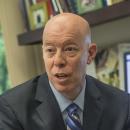University of Chicago Law Clinic Requests Release of Video of 17-Year-Old Boy
The Civil Rights and Police Accountability Clinic of the University of Chicago Law School released a statement with the Invisible Institute requesting that the City of Chicago publicly release all video of the October 20 Chicago police shooting and killing of Laquan McDonald, a 17-year-old black youth, that took place on the southwest side of Chicago.
Inconsistencies in the police account of Laquan McDonald’s death prompted the University of Chicago Legal Clinic and the Invisible Institute to investigate the shooting. On the basis of their investigation of the incident, Clinical Law Professor Craig Futterman and writer Jamie Kalven of the Invisible Institute say that there is strong evidence that the shooting was not justified.
Last spring, the Clinic’s students won a legal precedent before the Illinois Appellate Court that established that records that relate to police misconduct complaints belong to the public. In July, the Clinic, together with lawyers from the Loevy Law Firm and the People’s Law Office, negotiated an historic agreement with the Emmanuel administration to implement the Appellate Court’s decision as policy in Chicago. The new transparency policy opened the Chicago Police Department to the public, by allowing access to police misconduct complaints and their completed investigations to enable people to assess how misconduct complaints are addressed by the City. However, the new policy did not resolve the extent to which the City would release information in ongoing misconduct investigations—investigations that may continue for years.
The call for the City to share information with the public about its investigation into McDonald’s death comes as another team of Clinic students has been working in a collaborative project with inner city Chicago high school students that seeks to improve relations between black youth and police. (The Law School is hosting a Youth/Police Conference, drawing on their work, on April 24-25, 2015. The conference aims to address issues arising from interactions between African-American youth and the police in urban America—questions that have become even more urgent in the wake of the deaths of other African-Americans at the hands of police in Ferguson, New York, and Cleveland.)
Laquan McDonald was shot and killed by a police officer at 41st and Pulaski. A spokesperson for the Fraternal Order of Police, Pat Camden, said the boy was carrying a knife and threatened the officers. A witness disagrees, saying Laquan was shying away from the officers when he was first shot. Then, according to the witness, as Laquan lay on the ground, the officer fired repeatedly into his body.
Chicago Police Department policy requires officers to activate their in-car cameras when in pursuit. There is thus almost certainly video footage of the incident.
“Sources report that a police officer repeatedly fired into the boy’s body as he lay on the ground,” said Futterman. “If they are correct, this isn’t a case of self-defense. It’s an execution. The video should reveal the truth.”
Against the background of a series of recent deaths of black men at the hands of the police in Ferguson, New York, and Cleveland, Futterman and Kalven call on the City to release all video footage of the incident. They write:
Ultimately, the issue of transparency in this case turns on the question being posed by public demonstrations across the nation: how much do we, as a society dedicated to equality under law, value the black lives?
Read their full statement here.
http://the.invisible.institute/news/2014/laquan-mcdonald
“Our work with inner city high school students has taught us about the depth of distrust and disaffection that black youth feel toward the Chicago police,” Futterman observed.
“The best way to rebuild trust is through open-ness and honesty with the community. No matter what the video may expose, it will begin an honest conversation about police accountability and race in Chicago.”
Craig Futterman is Clinical Professor of Law at the University of Chicago Law School, where he directs the Civil Rights and Police Accountability Project at the Mandel Legal Aid Clinic.
Jamie Kalven, a writer and human rights activist, is director of the Invisible Institute, a journalistic production company. He was the plaintiff in Kalven v. Chicago, a decision of the Illinois Appeals Court earlier this year that opened police misconduct files to the public.
